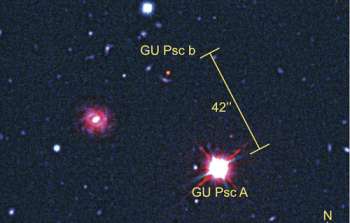sci14027 — Announcement
Direct Imaging of an Unusual Exoplanet
May 20, 2014
Marie-Ève Naud (Université de Montréal, Canada) and collaborators report the discovery of a planetary-mass companion of GU Psc, separated by 42 arcseconds (equivalent to about 200 Astronomical Units). The team had originally identified companion candidates based on red colors in a survey using the Gemini Multi-Object Spectrograph (GMOS) at Gemini South. Subsequent near-infrared imaging and spectroscopy suggested a T dwarf spectral type. Further spectroscopy using the Gemini Near-Infrared Spectrograph (GNIRS) on Gemini North and space photometry confirmed a spectral type around T3.5. The host star is identified as a likely member of the AB Doradus Moving Group, which sets an age of 100 Myr, and therefore a companion mass of 9 to 13 times the mass of Jupiter. Such systems are not likely to be common: this is the only widely-separated companion found in the sample of over 90 stars. The joint press release from Gemini, the Université de Montréal, Observatoire du Mont-Mégantic, and Centre for Research in Astrophysics of Québec is posted, and the results are published in The Astrophysical Journal.
About the Announcement
| Id: |
ID
sci14027
|
